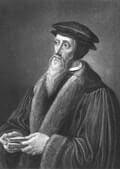the Third Week after Easter
Click to donate today!
Bible Commentaries
Calvin's Commentary on the Bible Calvin's Commentary
Old Testament
New Testament
John Calvin, a principal figure in the development of the system of Christian theology later called Calvinism, was born on July 10, 1509, in Noyon, Picardy, France. Educated initially for a career in the Church at the University of Paris, Calvin's intellectual journey took a decisive turn towards Reformation principles in the early 1530s, leading him to break with the Roman Catholic Church.
In 1536, Calvin published the first edition of his seminal work, the "Institutes of the Christian Religion," a comprehensive exposition of Protestant theology. His writing profoundly influenced the direction of the Protestant Reformation, articulating core tenets such as the sovereignty of God in salvation and the concept of predestination. The "Institutes" would go through several editions, each more extensive than the last, reflecting Calvin's evolving theological thought and the maturation of the Reformation movement.
Calvin's impact extended far beyond his writings. In 1536, he was persuaded to stay in Geneva, where he played a significant role in transforming the city into a model of Protestant morality and discipline. His efforts in Geneva included the establishment of a new church governance structure, the promotion of education for all, and the enforcement of a moral code that was remarkably strict by modern standards. His work in Geneva made the city a hub for Protestant exiles from across Europe, who subsequently carried Calvin's ideas to their home countries.
Calvin's theological legacy is vast, influencing not only religious thought but also the development of political theory, education, and society in the Western world. His emphasis on the authority of Scripture and the priesthood of all believers contributed to the spread of democratic ideas and the growth of literacy. Despite controversies surrounding his teachings and his role in the execution of heretics like Michael Servetus, Calvin remains a towering figure in the history of Christianity, revered for his intellectual rigor, profound devotion to God, and the enduring influence of his ideas on global Christianity.
